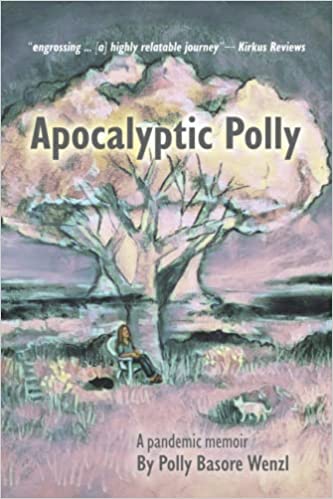“Apocalyptic Polly: A Pandemic Memoir,” by Polly Basore Wenzl (AngelBooks, 2021, 125 pages, $16.99)
By Ted Ayres
Polly Basore Wenzl’s book, subtitled “A pandemic memoir,” proposes to be the story of her life in Wichita during 2020-21. And the book does address the chronological period between February 25, 2020, when Wenzl heard a radio report of the coming global pandemic, through July 2021, as she tries to help her son, Henry, deal with the death of his father, Wenzl’s ex-husband.
But as readers, we are privileged that Wenzl shares so much more — about love, divorce, feline friends, catastrophic illnesses, the Cold War, blended families, life and death.
A former journalist at The Wichita Eagle (and before that a reporter in Washington, D.C., New York and Moscow), Wenzl tells a deeply personal story in this book. She relates that the book’s title was a nickname given to her by her first husband, who thought she was always forecasting future potential dangers and dictating steps to protect against them: Prepare. Prevent. Respond! Whether it was due to growing up during the Cold War or paranoia, the persona seemed tailor made for a pandemic.
Using her memory and social media postings — many of which are fully set forth in the book — Wenzl shares the steps she took to protect family and friends and maintain her sanity.
However, as mentioned, there’s plenty more: the death of George Floyd; a presidential election and insurrection in Washington, D.C.; a possible diagnosis of endometrial cancer; the death of her former husband (with whom she maintained a close relationship) from a heart attack; and finding her current husband, the journalist Roy Wenzl, on the floor of their kitchen suffering a pulmonary embolism.
Wenzl is a skilled writer and storyteller. She closes with these words: “We can prepare. We can try to prevent. And whatever happens, we must respond. But we need not be paralyzed by fear. I am no longer Apocalyptic Polly. Turns out, on the other side of the end of the world, I stopped being afraid of everything. Because I realized death is inevitable — and living well isn’t.”
Contact Ted Ayres at ted.ayres@shockers.wichita.edu.









